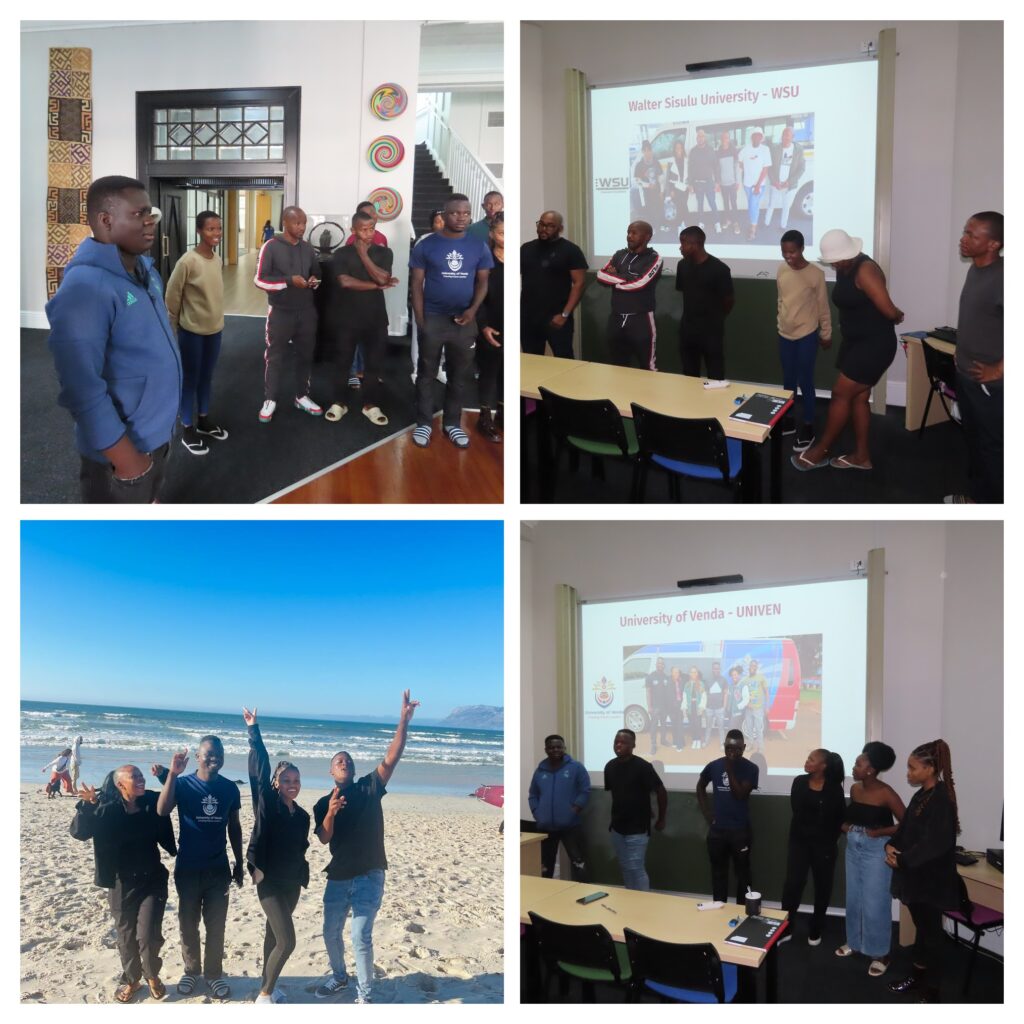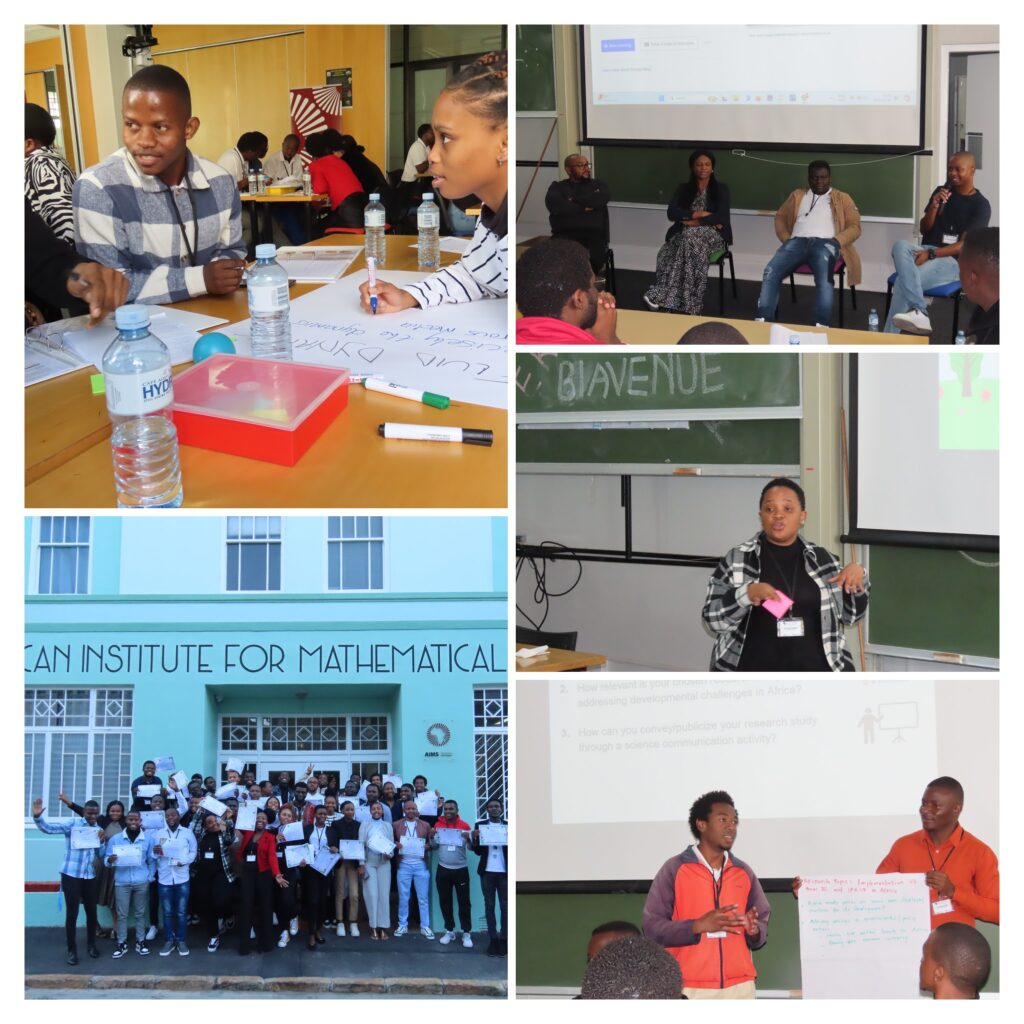AIMS South Africa, in partnership with African Gong, has made significant strides in strengthening Africa’s capacity for impactful science communication. From 17 to 19 April, the two organisations successfully trained the 5th cohort of AIMS South Africa master’s students in Afrocentric science communication skills. This three-day workshop served as the second phase of the 2024 Africa Scientifique (AS) programme, following the introductory workshop of Phase 1. The AS programme aims to equip young and emerging African scientists and academics with the skills necessary to communicate science effectively to non-scientific audiences, tackling one of the key challenges within higher education on the continent—impactful science communication.
One participant reflected on their experience, saying, “Through the Africa Scientifique workshop, I’ve developed a greater interest in the Africa Scientifique programme, and the content was well delivered. I have seen a massive improvement in my science communication skills over the past three days and hope this continues as I progress in my career. I’ve transformed greatly—my confidence, controlling my nerves, voice projection, and overall, I can say I saw a new version of myself. Thank you, AS programme.”
Since 2020, the AS programme has successfully been delivered annually to cohorts of AIMS Master’s students. This year, the programme expanded to include ten Honours students from two Historically Disadvantaged Universities in South Africa—the University of Venda (UNIVEN) and Walter Sisulu University (WSU). Each group was accompanied by a lecturer who contributed to the workshop’s panel discussion and will continue to support their students during the post-workshop mentoring phase (Phase 3, May-October 2024). This expansion aligns with AIMS’s strategic objectives and the Department of Science and Innovation’s transformation imperatives. From this year onwards, the annual programme is expected to benefit more universities in South Africa.
During their visit to AIMS South Africa, students and lecturers from UNIVEN and WSU were introduced to AIMS’s vision and programmes. They also had the opportunity to live, dine, and interact with AIMS students, researchers, and staff from various African countries. The highlight of their visit was the establishment of professional relationships and future academic collaborations.

Mr Charles Kakuli, a lecturer at Walter Sisulu University, shared his insights, “The workshop was a truly enriching and invaluable experience for all of us. It undoubtedly sparked a renewed enthusiasm in myself and our students for further exploration and engagement in science communication. I cannot overlook the warmth and hospitality extended to us by the AIMS students during our stay. The social interactions, meaningful conversations we shared, the Friday evening walk around Muizenberg, and the engaging games we played thereafter created an atmosphere of friendship and connection. The genuine interest the AIMS students showed in fostering collaboration and knowledge exchange was truly commendable.”
Ms Masego Mothapo, a student at the University of Venda, echoed this sentiment, saying, “Visiting AIMS was a nice experience for me as I met many amazing, smart and inspirational people. Getting to learn more about different people’s research helped me understand science better, it motivated me also to pursue my studies and it taught me about a lot of projects related to science that I was not aware of.”

The 3-day workshop programme was filled with thought-provoking talks, hands-on sessions, and networking opportunities. On the first day, Mr Refilwe Molefe, an AIMS South Africa Master’s student, encouraged participants to embrace challenges and seize opportunities for growth and transformation. “Let us all embrace the intensity that the workshop has to bring. Let us dive headfirst into the opportunities that it presents, and let us imagine ourselves on the other side as leaders, communicators, and change-makers. We come into these doors as the raw material that is going to be refined into a precious gem. Every single unprofessional impurity is going to be stripped off of us, and what is going to be left behind is sharpened focus, clear vision, and a renewed sense of purpose.” he said.
During his welcome speech, Prof. Ulrich Paquet, Executive Director of AIMS South Africa, urged participants to use their mathematical skills to effect positive change within their communities. He encouraged them to learn, grow, and return to their communities with a renewed vision.
“You are here because you are the shining stars of tomorrow. You are mathematical scientists, mathematicians, some physicists, and some data scientists. All of you possess unique talents that could be harnessed to make this world a better place. How do you use those talents? That’s why you’re here—to learn how to communicate with the outside world about mathematics and to envision the future of South Africa and the African continent,” said Prof Paquet.
Following Prof Paquet’s remarks, Profs Claire David and Karin-Therese Howell (Academic Directors of AIMS South Africa), Prof. Wilfred Ndifon (President of AIMS Research & Innovation Centre: Rwanda), Dr Elizabeth Rasekoala (President of African Gong), and Dr Rejoyce Gavhi-Molefe (Manager of House of Science) delivered introductory remarks. They emphasised the importance of building a cohort of well-rounded mathematical scientists who can communicate effectively and encouraged participants to realise the value of the workshop, engage with peers and facilitators, and “learn by doing.”
Prof. Ndifon emphasised the crucial role that AIMS and the AIMS Research Innovation Centre play in developing the skills and knowledge of young and emerging researchers and academics. “Science is a gift. I think it’s humanity’s greatest gift, and so its benefits need to be shared widely and equitably, and science communication is key to achieving that. As scientists, we are often trained to do science but not to communicate it well to non-scientists, and that’s a problem because our work broadly impacts society. Society’s continual support for the scientific enterprise depends to a great degree on scientists’ ability to communicate science effectively.”
The workshop was facilitated by the House of Science Manager, the African Gong President, and experts in science communication. Mathematical scientists and AS Programme alumni, now pursuing careers in academia and industry, also contributed over the three days. The workshop covered rich and diverse sessions that framed globally inclusive yet Afrocentric discourses, narratives, and best practices. These sessions aimed to transform participants’ understanding and strengthen their commitment to equity, ethics, and hands-on public engagement.
Inherent in these best practices was solidarity with African publics through the inclusion of local and Indigenous languages in science communication and public engagement across the continent. This approach embraced contextualised socio-cultural dimensions, including gender inclusion.
“Science communication plays a key role in gender inclusion and ensures that there’s gender balance, especially in STEM. Moving forward, I’ll try to emulate this message and use science communication to promote gender inclusion. It also plays a crucial role in socio-cultural inclusion. In particular, we can use science communication to achieve Afrocentricity. From now on, I will ensure we shift from a Eurocentric narrative to an Afrocentric one,” said a 2024 AS workshop participant.
The panel discussion session featured Mr Lusani Mulaudzi, a Healthcare Actuary, Independent Non-Executive Director, Consultant, and Lecturer at the University of Cape Town; Mr Tshifhiwa Ranwaha, a Lecturer at the University of Venda; Dr Omowunmi Isafiade, a Senior Lecturer in Computer Science at the University of the Western Cape; Mr Molahlehi Charles Kakuli, a Lecturer at Walter Sisulu University; and Mr Siyabonga Mthimkulu, a PhD student at AIMS South Africa and 2022 AS alumnus.
During the panel discussion, the members shared diverse lived experiences, insights, practical techniques, and strategies for advancing and leveraging science communication skills and opportunities in one’s career progression.
On the final day of the three-day workshop, participants had the opportunity to put into practice what they had learned from the sessions on Days 1 and 2. They benefitted from the hands-on experiences of two AS alumni—Mr Cebolenkosi Ngema (2020, Data Analyst at Games Global) and Ms Beatrice Similindi (2023, MSc Student at the University of Johannesburg and iThemba LABS).
The facilitators and alumni motivated and encouraged the participants to reflect on their journeys as emerging mathematicians, their scientific knowledge, and the societal challenges facing their respective communities. This reflection enabled the participants to conceptualise, design, and present individual practical science communication project activity frameworks in three minutes using one PowerPoint slide. They will deliver these projects in African indigenous languages within their communities during the post-workshop mentoring phase (Phase 3, May–October 2024).
A participant reflected on their experience, “I have learned how to frame social problems and use mathematical concepts to solve them. Understanding your community and the challenges it faces helps to provide critical solutions. This was an impactful session, and I have learned to be a visionary scientist who is solution-oriented. The overall delivery was excellent, from working in groups to generate ideas to crafting project proposals. I’ve learned a lot, and I hope to give back to the community through various projects.”
The third day of the workshop concluded on a high note: All participants were awarded certificates, and two individuals—Ms Masego Ester Mothapo and Mr Esau Moyoweshumba—received the AS Excellence Awards, which included a cash prize from African Gong. Over the three days, both demonstrated significant improvement in their engagement and communication skills, particularly in presentation and proposal writing.
Special thanks go to the AIMS staff, the 2023/24 House of Science volunteers, and Noluthando Sithole, House of Science Intern, for providing support and logistical arrangements for the workshop.
The workshop wrapped up with the participants’ Dance Challenge

